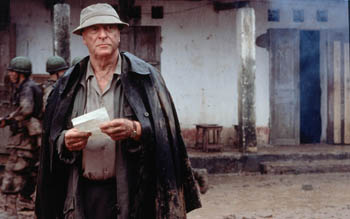![[Metroactive Movies]](/movies/gifs/movies468.gif)
[ Movies Index | Show Times | Silicon Valley | Metroactive Home | Archives ]
|
Buy 'The Quiet American' by Graham Greene.
Buy the 'Quiet American' soundtrack.
|

Photograph by Phil Bray Citizen Caine: Michael Caine plays a war-weary correspondent in 'The Quiet American.' Pox Americana Phillip Noyce's 'The Quiet American' traces the roots of America's role in Vietnam through a closely watched love triangle THOSE FEW saints among the many sinners on the Internet--those who transcribe public-domain classics of literature--well, even these hardworking scribes haven't posted the following nugget from "Dipsychus" by the British poet Arthur Clough (1819-61): "I drive through the street, and I care not a d-mn, / The people they stare, and they ask who I am / And if I should chance to run over a cad / I can pay for the damage, if ever so bad." Clough, who had one foot in the age of Byron and another in Victorian England, is writing about the cad: those Lucifer-proud English noblemen in their heedless carriages. Before I went to the library to find this quatrain, all I discovered on the Internet were similar sentiments (less elegantly expressed) from gangster rap and redneck-rage sites. The arrogance is modern. So is the movie that quotes this poem, though it is set about 50 years ago. Clough's lines serve as a kind of epigraph for Phillip Noyce's superb adaptation of Graham Greene's The Quiet American. These verses are passed, like a shared cigarette, between two men who become friends in Indochina in the 1950s, as a prelude to America's fatal involvement in the Vietnamese war for independence. The skidding London Times reporter Fowler (Michael Caine) is going to seed in Saigon with whiskey and opium. His main reason for staying is a woman, Phuong (Do Thi Hai Yen), whom he loves but cannot marry; in a typical Greene plot device, Fowler's estranged Catholic wife won't let him divorce.
In flashback, Fowler tells how he met an Ivy Leaguer named Pyle, just like America's best-loved war correspondent. The never-better Brendan Fraser plays Pyle. Though he's as likable as a puppy, his can-do American spirit conceals undercover designs. Supposedly with a health agency, he is actually working in the shadow world of intelligence This is no ordinary exotic adventure about two intruders in a political tinderbox, fighting over a woman they cannot trust (nor should she trust them, for that matter). Filmed in Vietnam, The Quiet American depicts a colonial rot and decadence that's as rich as cake. Christopher Doyle's cinematography is impressive. Most notable are the scenes during an excruciatingly tense night of hiding from rebel forces, shot in some of the lowest light I've ever seen in a feature film. The subtwilight maximizes the sense of peril. We think of a great performance as playing against type, but in some cases, the really best work tunnels into a trademark role, finding in it some new depths and resonance. For decades, Michael Caine has played Cockney climbers. In good films and bad, Caine has gone from '60s rebel to culpable, crumbling middle-aged man. It's a pleasure to watch the armature of stage-trained English actors. I find the discipline and reticence more compelling than the work of emotion-wracked Penns and Hoffmans (Phillip Seymour and Dustin). Caine, who was influenced enough by Humphrey Bogart to take his stage name from The Caine Mutiny, is the perhaps the least theatrical of English leads. He's the most attuned to the lens, the least-attuned to stagecraft. His voice is pitched the softest, and his efforts are the smallest. In his precision and emotion, he blends the best aspects of American and British acting. It is easy to see why Miramax delayed releasing The Quiet American in the wake of 9/11. Greene's early account of U.S. scheming during the Cold War is a critique of the way American intelligence forces engineered puppet governments. But the film savages French and English colonialism as well. Mostly, the film will offend those who try to rewrite the Vietnam War as a success of Communist containment, a case where we won the war while losing the battle. Such revisionists could quote that better-known Clough verse: "Say not the struggle naught availeth, / The labour and the wounds are vain, / The enemy faints not, nor faileth, / And as things have been, things remain." But how can you say the struggle in Vietnam availed anything? The Quiet American arrives right as we're prepared to start an Iraq adventure, a new folly that looks so much like the old ones. The film delivers a vivid lesson on how a debacle begins with the best intentions. It's not just a mirror of a tawdry past but a window looking out into a dangerous future.
The Quiet American (R; 118 min.), directed by Phillip Noyce, written by Christopher Hampton and Robert Schenkkan, based on the novel by Graham Greene, photographed by Christopher Doyle and starring Michael Caine and Brendan Fraser, opens Friday at selected theaters.
Send a letter to the editor about this story to letters@metronews.com. [ Silicon Valley | Metroactive Home | Archives ]
|
From the February 13-19, 2003 issue of Metro, Silicon Valley's Weekly Newspaper.
Copyright © Metro Publishing Inc. Metroactive is affiliated with the Boulevards Network.
For more information about the San Jose/Silicon Valley area, visit sanjose.com.